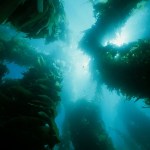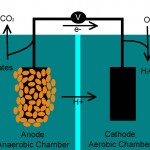Energy
I grew up on the coast of California, and I loved to surf. At my favorite break, Pleasure Point, the best waves were often at low tide, but low tide also meant seaweed. Lots of seaweed.
[Source]
The giant kelp of Monteray Bay is an astonishing organism. It's not actually a plant, it's a brown algae, and it can grow 12 inches per day. This rapid growth makes it an ideal resource, and a bane of surfers that get their fins caught in thick mats.
You can't tell, but it was definitely kelp that made me fall, not the fact that I was too far forward and unable to turn. No, really...
Brown algae…
Disclosure Note: I was given a free digital copy of this book for review.
Thrillers aren't typically my cup of tea. I most often stick to non-fiction, and when it comes to novels, I tend to favor books that use the plot to develop characters, rather than the other way around. But when Amy Rogers sent me a copy her novel Petroplague, she billed it as "fictionalized science, not science fiction," and I was intrigued. Coupled with the fact that it's a book about bacteria and about energy and about science, I couldn't say no.
Some spoilers follow, but as we now know, spoilers don't actually spoil…
Bacteria are tiny. Compared to our cells, they can seem insignificant. There are about ten times more bacteria cells in your gut *right now* than there are human cells in your entire body, but they only make up about 5% of your mass. They're tiny, but they're successful - they live in places we can't, they can metabolize things we can't, and they're everywhere. Despite this success, there's some things they don't do, like multicellularity, but why?
PZ has a great review of a recent paper in Nature that tries to answer that question, so I don't need to recapitulate it, but I have just a couple…
A lot has been said, written, and discussed about the recent Oil Spill in the Gulf of Mexico. The spill has been capped but the damage remains. The Gulf of Mexico has now become the feedstock of several battles, fierce and feeble, in the legal, political and scientific realm. What battles you say? It's what on your mind as well - What will happen of the Gulf of Mexico? What do we need to do to save the physical, chemical and biological environment? And the worst of all - Is the damage irreversible?
Sadly, we don't have any answers yet. And let's face it - there is no right answer. What we do…
[This post was originally published at webeasties.wordpress.com]
Although I studied physics and chemistry in college, I have always held an inherent appreciation for how life works. And now, researching microbes in action, I am continually amazed by their diverse habitats and metabolisms. It is remarkable to think how despite the diminutive size of microbes, they are dominant members of our biosphere and play a key role in every known biogeochemical cycle. This list includes carbon, sulfur, nitrogen, and oxygen as well as trace metals such as iron, cobalt and zinc. I have started thinking…


